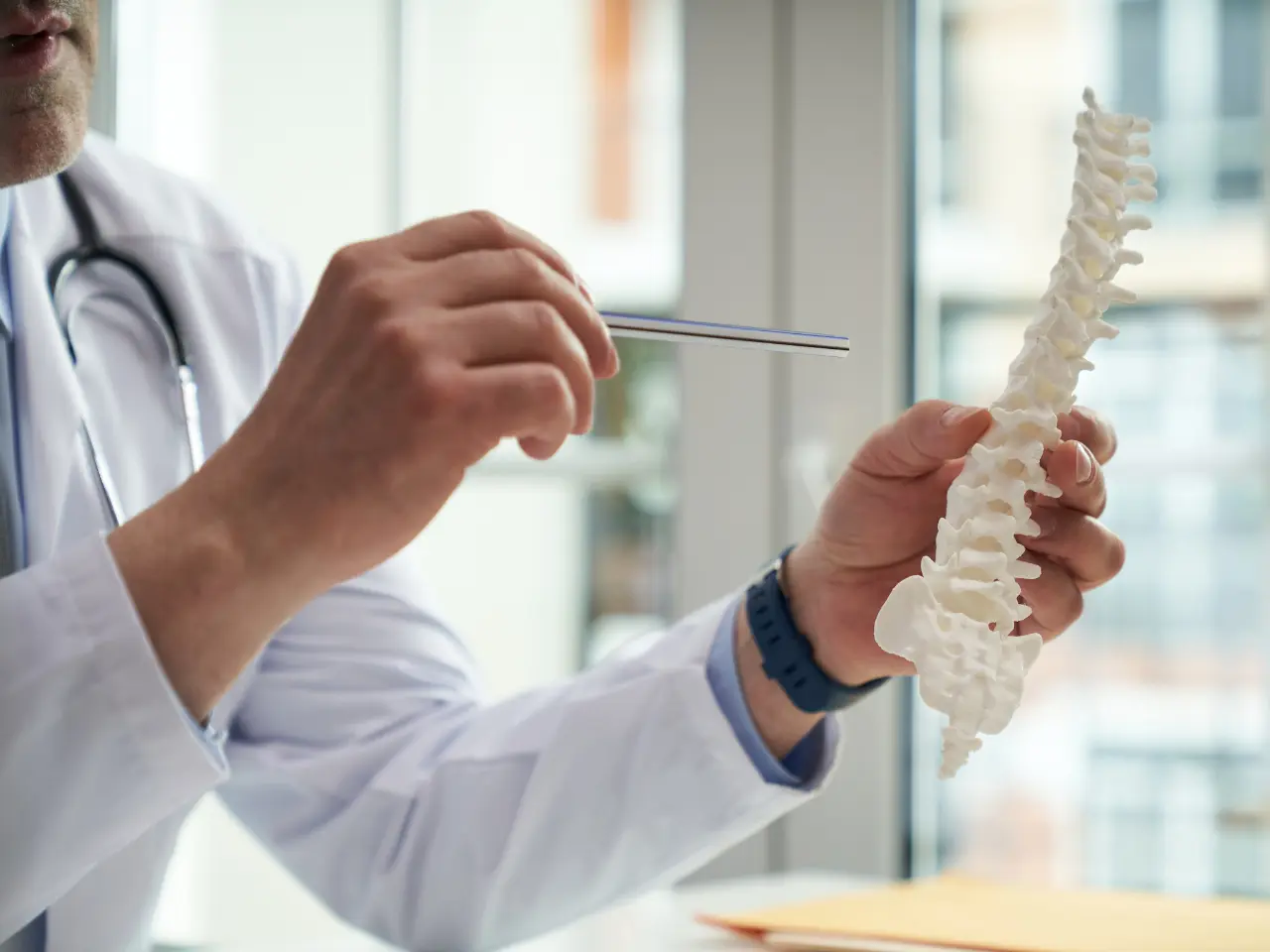Spine Surgery for Athletes: What You Need to Know
Spinal health is a crucial aspect of an athlete’s overall well-being, directly influencing their performance and longevity in sports. Unfortunately, athletes are prone to various spine problems due to the physical demands of their activities. Spine-related issues can significantly impact an athlete’s career, leading to pain, reduced mobility, and even the need for surgery.
Dr. Vignesh Pushparaj, a leading spine surgeon in Chennai, is dedicated to helping athletes overcome these challenges and return to their peak performance levels.
Understanding Spine Problems in Athletes
Common Spine Issues Faced by Athletes
Athletes are particularly susceptible to spine problems due to the repetitive stress and high-impact nature of their sports.
Some of the most common spine issues include:
- Low Back Pain in Athletes: A prevalent issue that can result from muscle strain, ligament injuries, or more severe conditions like herniated discs.
- Herniated Discs: Occur when the soft center of a spinal disc pushes through a crack in the tougher exterior, often leading to pain, numbness, or weakness.
- Spinal Fractures: High-impact sports can lead to fractures in the vertebrae, which may require surgical intervention.
- Spondylolysis and Spondylolisthesis: Stress fractures in the vertebrae can cause one of the bones to slip out of place.
- Spinal Stenosis: Narrowing of the spinal canal that can compress nerves, leading to pain and neurological symptoms.
Causes of Spine Problems in Athletes
The causes of spine problems in athletes are often linked to the physical demands of their sports:
- Repetitive Stress and Overuse Injuries: Continuous strain on the spine from training and competition.
- High-Impact Sports and Trauma: Activities such as football, gymnastics, and weightlifting can lead to acute injuries.
- Poor Posture and Body Mechanics: Incorrect techniques and posture during sports can exacerbate spine problems.
- Genetic Predispositions: Some athletes may have a genetic predisposition to spine conditions, making them more vulnerable.

When is Spine Surgery Necessary for Athletes?
Indications for Spine Surgery in Athletes
While many spine problems can be managed with conservative treatments, surgery becomes necessary when:
- Persistent Low Back Pain in Athletes: Pain that does not respond to non-surgical treatments may require surgical intervention.
- Neurological Deficits: Weakness, numbness, or other neurological issues due to nerve compression.
- Severe Spinal Deformities: Conditions like scoliosis that affect an athlete’s performance.
- Unstable Spinal Fractures: Fractures that threaten the stability of the spine.
- Progressive Spinal Conditions: Conditions such as degenerative disc disease that worsen over time.
Types of Spine Surgery for Athletes
Depending on the specific condition, the following types of spine surgery may be recommended:
- Microdiscectomy: Removal of a herniated disc that is pressing on a nerve.
- Spinal Fusion: Joining two or more vertebrae to eliminate painful motion.
- Laminectomy: Removal of part of the vertebrae to relieve pressure on the spinal cord or nerves.
- Artificial Disc Replacement: Replacement of a damaged disc with an artificial one.
- Minimally Invasive Spine Surgery (MISS): Advanced techniques that reduce recovery time and tissue damage.
The Impact of Spine Surgery on Athletes
Short-Term Impact
Spine surgery, while often necessary, can have significant short-term effects on athletes:
- Postoperative Pain and Discomfort: Pain management is critical during the initial recovery phase.
- Initial Limitations in Mobility and Function: Temporary restrictions on movement and activities.
- Recovery Time and Time Away from Sports: The recovery period can vary, requiring athletes to take a break from their sport.
Long-Term Impact
In the long term, spine surgery can lead to significant improvements but also comes with considerations:
- Restoration of Function and Pain Relief: Most athletes experience relief from pain and improved function, allowing them to return to their sports.
- Potential Changes in Athletic Performance: Some athletes may notice changes in their performance post-surgery, depending on the extent of their condition and the surgery performed.
- Risk of Re-Injury or New Spine Problems: Athletes may need to modify their training to prevent future injuries.
Psychological Impact
The psychological aspect of spine surgery should not be overlooked:
- Mental Challenges During Recovery: Athletes may struggle with the mental aspects of recovery, including frustration and anxiety about their return to sports.
- The Role of Motivation and Mental Resilience: Staying motivated and mentally strong is crucial for a successful recovery.
- Importance of Psychological Support and Counseling: Mental health support can be beneficial in managing the psychological impact of surgery.
Rehabilitation and Recovery Post-Spine Surgery
The Role of Physical Therapy
Rehabilitation is a critical component of recovery:
- Importance of a Tailored Rehabilitation Program: A personalized program ensures that recovery is aligned with the athlete’s needs and goals.
- Exercises to Strengthen the Spine and Core: Focus on strengthening the muscles that support the spine.
- Gradual Return to Sports-Specific Activities: Progression should be gradual to prevent re-injury.
Nutritional Support for Recovery
Proper nutrition plays a key role in healing:
- Essential Nutrients for Bone and Muscle Healing: Calcium, vitamin D, and protein are vital for recovery.
- Importance of Hydration and a Balanced Diet: Staying hydrated and maintaining a balanced diet supports overall health and recovery.
Tips for a Successful Return to Sports
Returning to sports post-surgery requires careful planning:
- Listening to Your Body and Avoiding Overexertion: It’s crucial to avoid pushing too hard, too soon.
- Maintaining Regular Follow-Ups with Your Spine Surgeon: Ongoing medical supervision ensures recovery is on track.
- Adopting Proper Techniques and Ergonomics in Sports: Proper techniques help prevent further injuries.
Why Choose Dr. Vignesh Pushparaj for Spine Surgery in Chennai?
Expertise in Spine Surgery for Athletes
Dr. Vignesh Pushparaj is highly experienced in treating athletes with spine problems:
- Experience in Treating Spine Problems in Athletes: Specialized care for sports-related spine issues.
- Advanced Surgical Techniques and Minimally Invasive Options: Utilizes the latest technology to minimize recovery time and maximize outcomes.
Comprehensive Care Approach
Dr. Vignesh offers a holistic approach to spine care:
- Personalized Treatment Plans: Each treatment plan is customized to the athlete’s specific needs.
- Integration of Physical Therapy and Rehabilitation: Comprehensive care that includes post-surgery rehabilitation.
- Emphasis on Long-Term Athlete Health and Performance: Focus on helping athletes return to their sport stronger and healthier.
Testimonials and Success Stories
Dr. Vignesh has a track record of successful outcomes:
- Success Stories of Athletes Who Have Undergone Spine Surgery: Real-life examples of athletes who have returned to their sports post-surgery.
- Positive Feedback from Patients: High satisfaction rates among athletes who have received treatment.
Conclusion
Spine problems in athletes can be debilitating, but with the right treatment, including spine surgery, athletes can regain their strength and return to their sports. Dr. Vignesh Pushparaj, the best spine surgeon in Chennai, is committed to helping athletes overcome their spine issues and achieve a successful recovery.
Whether you’re dealing with low back pain or a more complex spine condition, expert care from Dr. Vignesh can make all the difference in your athletic career.
Book An Appointment:
If you are an athlete experiencing spine problems, don’t hesitate to seek expert advice. Schedule a consultation with Dr. Vignesh Pushparaj today to discuss your options for spine surgery and start your journey toward recovery.






0 Comments